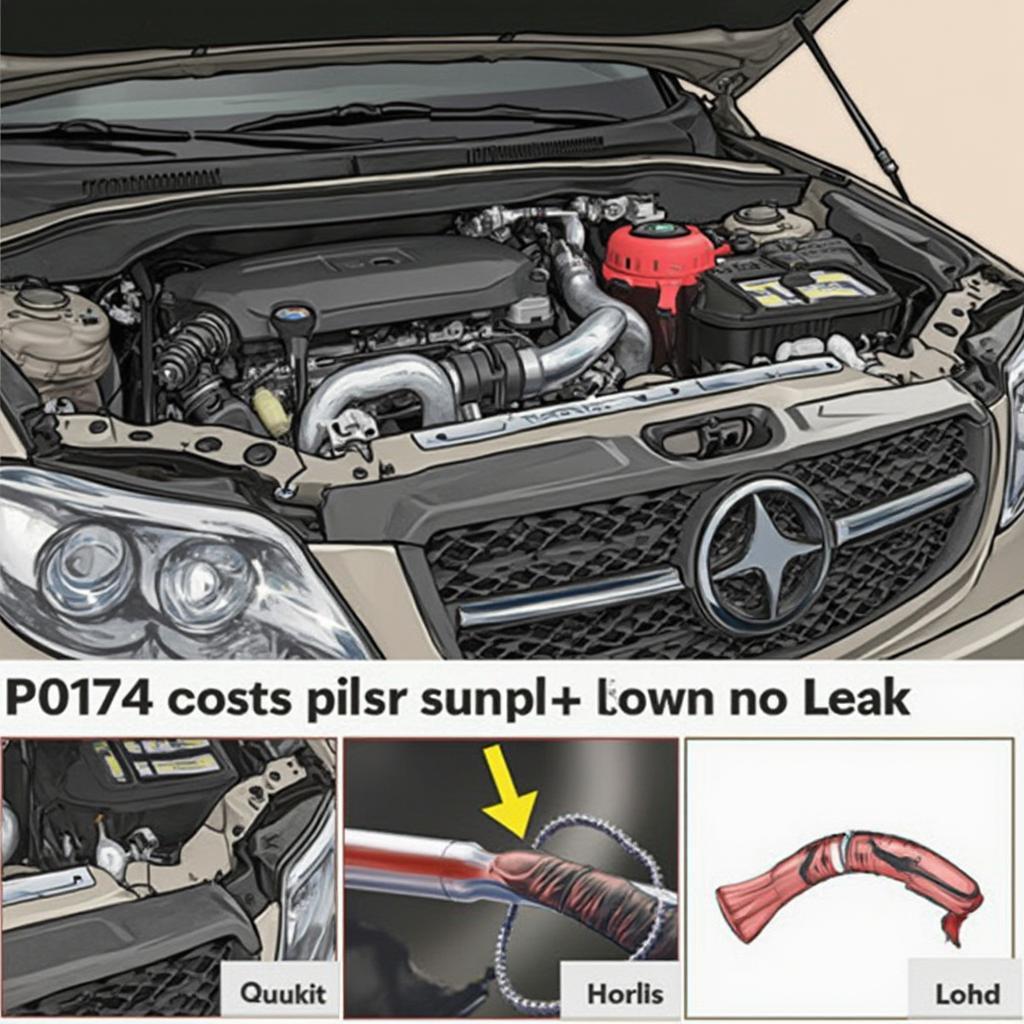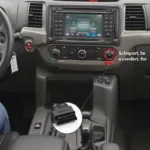The OBD2 code P0174 indicates a lean fuel mixture in engine bank 2. This diagnostic trouble code (DTC) signifies that the air-fuel ratio is outside the acceptable parameters, with too much air and not enough fuel. Understanding this code is crucial for effective troubleshooting and repair.
What Does P0174 Mean?
The P0174 code specifically refers to bank 2 of your engine, which is typically the side opposite of cylinder number one. A lean condition means there’s an excess of air in the air-fuel mixture entering the cylinders. This can impact engine performance, fuel economy, and potentially cause damage if left unaddressed. The engine’s computer, the powertrain control module (PCM), monitors the oxygen sensors to determine the air-fuel ratio and triggers the P0174 code when the mixture becomes too lean.
Common Causes of P0174
Several issues can contribute to a lean condition and trigger the P0174 code. These include vacuum leaks, faulty oxygen sensors, a malfunctioning mass airflow (MAF) sensor, a clogged fuel filter, low fuel pressure, or problems with the fuel injectors. Identifying the root cause requires a systematic diagnostic approach.
A vacuum leak can disrupt the carefully balanced air-fuel ratio, allowing unmetered air to enter the engine. Similarly, a faulty MAF sensor might provide incorrect readings to the PCM, leading to an improper fuel mixture.
 OBD2 Code P0174: System Too Lean (Bank 2) – Vacuum Leak Example
OBD2 Code P0174: System Too Lean (Bank 2) – Vacuum Leak Example
How to Diagnose and Fix P0174
Diagnosing the P0174 code requires a panlong obd2 diagnostic scanner and a methodical approach. Start by visually inspecting vacuum lines, hoses, and connections for leaks. Next, check the condition of the air filter and ensure it’s not excessively dirty or restricted.
Using your diagnostic scanner, monitor the fuel trims and oxygen sensor readings for bank 2. This data can provide valuable insights into the fuel system’s operation and help pinpoint the source of the problem. If the fuel trims are excessively positive, it suggests a lean condition.
Consider checking the fuel pressure with a gauge to ensure it meets the manufacturer’s specifications. Low fuel pressure can result in a lean mixture.
What Happens if You Ignore P0174?
Ignoring the P0174 code can lead to more serious engine problems. A prolonged lean condition can cause increased engine temperatures, potentially damaging pistons, valves, and even the catalytic converter. Furthermore, it can lead to reduced fuel economy and decreased engine performance.
“Addressing the P0174 code promptly is crucial for preventing costly repairs and maintaining optimal engine performance,” advises Robert Johnson, a seasoned automotive technician with over 20 years of experience. “Early diagnosis and repair can often prevent minor issues from escalating into major engine damage.”
P0174 vs. P0171: What’s the Difference?
While both P0171 and P0174 indicate a lean condition, they pertain to different engine banks. P0171 refers to bank 1, while P0174 refers to bank 2. This distinction is crucial when diagnosing the problem, as it narrows down the area to inspect.
Conclusion: Addressing P0174 for Optimal Engine Health
The OBD2 code P0174 signals a lean condition in engine bank 2, indicating an imbalance in the air-fuel mixture. Addressing this issue promptly is vital to avoid potential engine damage and maintain optimal performance. Utilizing a panlong obd2 diagnostic scanner and a systematic diagnostic approach will help you identify the root cause and implement the necessary repairs. Don’t ignore this important diagnostic trouble code – take action to ensure your engine’s longevity and efficiency.
FAQ
-
Can a bad gas cap cause P0174? While a loose or damaged gas cap can sometimes contribute to a lean condition, it’s less likely to be the sole cause of P0174 specifically targeting bank 2.
-
Is P0174 a serious problem? If left unaddressed, P0174 can lead to significant engine damage and reduced performance. Prompt diagnosis and repair are recommended.
-
How much does it cost to fix P0174? The cost varies depending on the underlying cause. A simple vacuum leak repair might be inexpensive, while replacing a faulty oxygen sensor or fuel injector can be more costly.
-
Can I drive with a P0174 code? While you might be able to drive short distances, it’s advisable to address the issue as soon as possible to avoid potential damage.
-
What tools do I need to diagnose P0174? A panlong obd2 diagnostic scanner is essential for reading and interpreting the code, as well as monitoring fuel trims and oxygen sensor data. Additional tools like a vacuum gauge and fuel pressure tester might be necessary depending on the diagnosis.
-
How can I prevent P0174 in the future? Regular maintenance, including checking for vacuum leaks and replacing worn-out components like oxygen sensors and fuel filters, can help prevent future occurrences of P0174.
-
Can I fix P0174 myself? Depending on your mechanical skills and the specific cause, you might be able to fix P0174 yourself. However, if you are unsure, it is always recommended to consult a qualified mechanic.
Common Scenarios Related to P0174
- Rough idle: A lean condition can cause the engine to idle roughly or inconsistently.
- Reduced fuel economy: A lean mixture means the engine is not burning fuel efficiently, leading to decreased mileage.
- Hesitation or stalling: The engine might hesitate during acceleration or stall unexpectedly due to the improper air-fuel ratio.
- Check engine light: The P0174 code will trigger the check engine light to illuminate on your dashboard.
Related Articles and Resources
- Check out our article on common OBD2 codes.
- Learn more about troubleshooting engine misfires.
Need more help? Contact us via WhatsApp: +1(641)206-8880, Email: [email protected]. We have a 24/7 customer support team.

